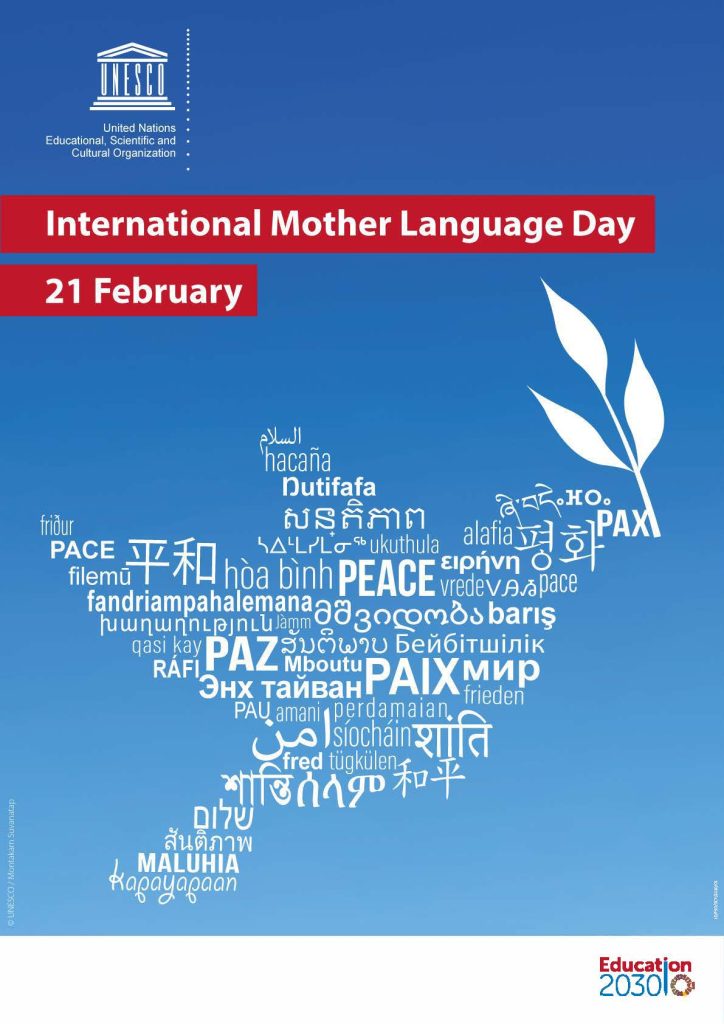On the 21st February, International Mother Language Day is observed globally, promoting the awareness and importance of linguistic and cultural diversity.

This year, UNESCO focuses on the fight against “a global learning crisis,” calling on all countries to ensure children are taught in their mother tongue.
Audrey Azoulay, Director-General of UNESCO explains, “To help fight the current global learning crisis, while preserving the linguistic diversity which is an essential cultural element, UNESCO urges governments to embrace multilingual education based on the mother tongue from the earliest years of schooling. We know it works—there is empirical evidence to prove it helps children learn.”
First announced by UNESCO in 1999, International Mother Language Day was acknowledged by the United Nations General Assembly in 2002 and has since brought awareness to linguistic ethics in relation to politics, education, indigenous rights and cultural preservation.
UNESCO’s statement ahead of this year’s celebrations draws on the movement to support African countries with the intent to develop multilingual learning.
A recent report from UNESCO entitled Born To Learn, shows that at best just one in five African children are taught in their mother tongue, despite the continent maintaining the highest linguistic diversity in the world. Consequently, this factor is continuously detrimental to learning outcomes. Correlating education data also shows that only one in five pupils master the basics of reading, writing and mathematics even after completing primary school.
Mozambique recently increased its bilingual education to 25% of schools and has introduced a new teacher training curriculum. Hailed as a success by UNESCO, the country has since seen a notable performance change in students studying at these schools, with an average of 15% higher grades achieved. In contrast, several African countries including Nigeria and Timor-Leste continue to debate the need for mother tongue education above official and colonial languages.
Leading the Indigenous Languages Decade 2022-2032, UNESCO also reminds the world of the importance of Indigenous language preservation on this International Mother Language Day.
There are more than 6,700 languages spoken worldwide and at least 40% are threatened with extinction due to a lack of speakers. UNESCO is committed to safeguarding endangered and indigenous languages, using the Indigenous Languages Decade to bring global attention to critical language loss and revitalization efforts.
Despite working independently to UNESCO and each other, initiatives like the Endangered Languages Project (ELP) and the Endangered Languages Documentation Program (ELDP) are working towards the same goal. Both projects celebrate and support global linguistic diversity with resources and cultural preservation projects. In 2022, the ELDP successfully documented two endangered sign languages Iscendo and Islabali in Java and Bali. To celebrate International Mother Language Day, the (ELP) is launching a unique language revitalization mentorship scheme to support global communities working to strengthen their languages.
International Mother Language Day is truly celebrated worldwide. In Manchester, England—designated a UNESCO city of literature in 2017—over 200 languages are spoken including Urdu, Arabic, Chinese, Bengali, Polish, Punjabi, and Somali. Ivan Wadeson, executive director, Manchester City of Literature notes that as this day is about celebrating all languages and therefore this year’s celebrations will include languages such as Roma, Kurmanji, Italian and Lingala. He explains, the day “is about celebrating all languages present in our city, not just the more prevalent”. Workshops, multilingual museum activity trails, games in different languages and story sessions will take place throughout the city of Manchester in February and March.
For Bengali speakers, International Mother Language Day 2023 brings an exciting technological development. The United Nations Development Program has launched a Unicode version of the UN Bangla font—complete with seven different iterations—easing access to the internet for Bengali language users. A day of remembrance for some, the 21st of February also brings an atmosphere of reflection to Bangladesh. With flags flying at half mast, many Bangladeshis are paying homage to those who sacrificed their lives for the right to Bangla as a state language in 1952.
The theme of the 2023 International Mother Language Day is “Multilingual education—a necessity to transform education.” Summarized by the UN, this aligns with recommendations made during the Transforming Education Summit.






